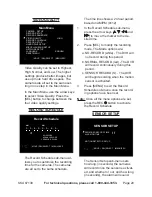
SKU 67139
For technical questions, please call 1-800-444-3353.
Page 5
grOunding
tO prevent
electric shOck
and death FrOm
incOrrect grOunding
wire cOnnectiOn:
Check with a qualified
electrician if you are in doubt
as to whether the outlet is
properly grounded. do not
modify the power cord plug
provided with the tool. never
remove the grounding prong
from the plug. do not use the
tool if the power cord or plug
is damaged. if damaged, have
it repaired by a service facility
before use. if the plug will not
fit the outlet, have a proper
outlet installed by a qualified
electrician.
grounded tools: tools with three
prong plugs
3-prong plug and Outlet
Tools marked with “Grounding Re-
1.
quired” have a three wire cord and
three prong grounding plug. The
plug must be connected to a properly
grounded outlet. If the tool should
electrically malfunction or break
down, grounding provides a low
resistance path to carry electricity
away from the user, reducing the risk
of electric shock.
(see 3-prong plug
and Outlet.)
The grounding prong in the plug is
2.
connected through the green wire in-
side the cord to the grounding system
in the tool. The green wire in the cord
must be the only wire connected to
the tool’s grounding system and must
never be attached to an electrically
“live” terminal.
(see 3-prong plug
and Outlet.)
The tool must be plugged into an
3.
appropriate outlet, properly installed
and grounded in accordance with all
codes and ordinances. The plug and
outlet should look like those in the
preceding illustration.
(see 3-prong
plug and Outlet.)
double insulated tools: tools
with two prong plugs
Outlets for 2-prong plug
Tools marked “Double Insulated” do
1.
not require grounding. They have
a special double insulation system
which satisfies OSHA requirements
and complies with the applicable
standards of Underwriters Labora-
tories, Inc., the Canadian Standard
Association, and the National Electri-
cal Code.
(see Outlets for 2-prong
plug.)






































